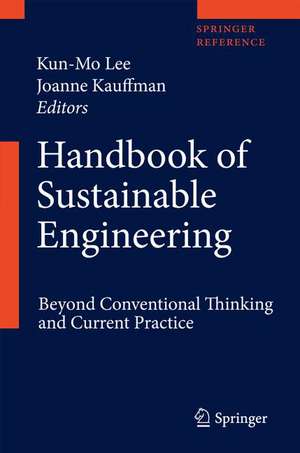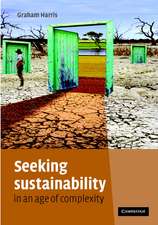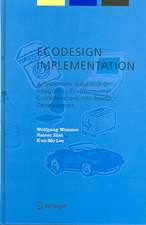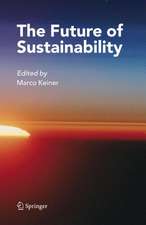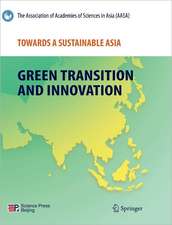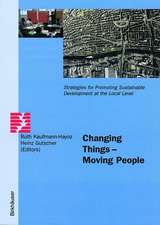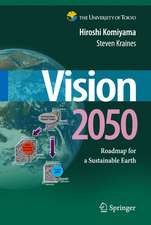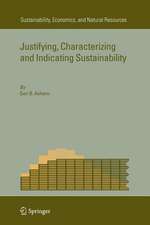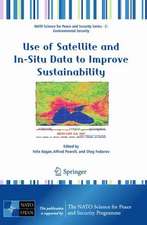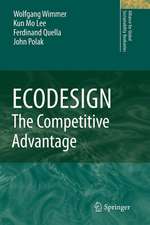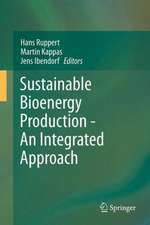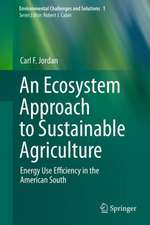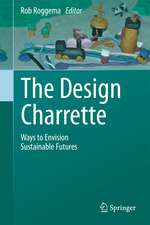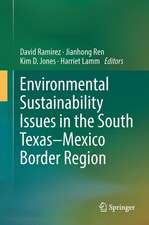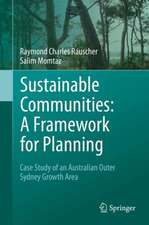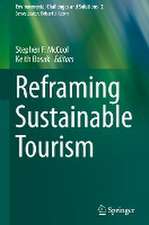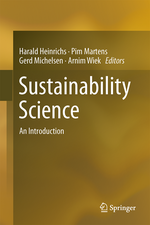Handbook of Sustainable Engineering
Editat de Joanne Kauffman, Kun Mo LEEen Limba Engleză Hardback – 30 apr 2013
Nobel Prize Winner Dr. R.K. Pachauri, Chairman, UN Intergovernmental Panel on Climate Change
As global society confronts the challenges of diminishing resources, ecological degradation, and climate change, engineers play a crucial role designing and building technologies and products that fulfil our needs for utility and sustainability. The Handbook of Sustainable Engineering equips readers with the context and the best practices derived from both academic research and practical examples of successful implementations of sustainable technical solutions. The handbook’s content revolves around the two themes, new ways of thinking and new business models, including sustainable production, products, service systems and consumption while addressing key assets based on new materials, optimized resource management, and new energy sources. Contributions reflect a focus on state-of-the art insights into employing smart materials, recycling e-waste, water utilization, solar cells, product lifecycles, transportation and reverse manufacturing. Supportive of this, underlying issues such as engineering education, consumer behaviour and the regulatory climate complete the handbook’s comprehensive treatment of the problems and most promising solutions.
Preț: 2652.85 lei
Preț vechi: 3490.59 lei
-24% Nou
Puncte Express: 3979
Preț estimativ în valută:
507.68€ • 551.27$ • 426.45£
507.68€ • 551.27$ • 426.45£
Carte tipărită la comandă
Livrare economică 18-24 aprilie
Preluare comenzi: 021 569.72.76
Specificații
ISBN-13: 9781402089381
ISBN-10: 1402089384
Pagini: 1320
Ilustrații: XXX, 1298 p. 427 illus., 325 illus. in color. In 2 volumes, not available separately.
Dimensiuni: 155 x 235 x 83 mm
Greutate: 2.19 kg
Ediția:2013
Editura: SPRINGER NETHERLANDS
Colecția Springer
Locul publicării:Dordrecht, Netherlands
ISBN-10: 1402089384
Pagini: 1320
Ilustrații: XXX, 1298 p. 427 illus., 325 illus. in color. In 2 volumes, not available separately.
Dimensiuni: 155 x 235 x 83 mm
Greutate: 2.19 kg
Ediția:2013
Editura: SPRINGER NETHERLANDS
Colecția Springer
Locul publicării:Dordrecht, Netherlands
Public țintă
Professional/practitionerRecenzii
“The book’s authors and editors accomplished their underlined goals and succeeded in providing integrated view of the whole ‘sustainable engineering’ concept. … The book can be highly recommended for people with engineering background and for environmental enthusiasts. The ‘Handbook of Sustainable Engineering’ combines outstanding research and insights for everyone interested in a sustainable and prosperous future.” (Vladislav Belyaev, foresight, Vol. 17 (3), 2015)
Notă biografică
Joanne Kauffman: Joanne Kauffman is retired Principal Research Scientist from the Massachusetts Institute of Technology (MIT), where she served as Deputy Director of the Lab for Energy and Environment, Lecturer, and Co-executive Director of the Alliance for Global Sustainability. Joanne has recently joined the IR3S (Integrated Research System in Sustainability Science) faculty at The University of Tokyo and is advisor to the program’s book series on Science for Sustainable Societies (Springer)
Kun-Mo Lee: received PhD in Environmental Engineering from the University of Utah, Salt Lake City, Utah, USA, in 1985. After graduation, he has worked for three years for the US Environmental Protection Agency as a principal research investigator in the area of domestic sewage sludge treatment, in particular, sludge treatment including anaerobic digestion, pyrolysis, and gasification.
Kun-Mo Lee: received PhD in Environmental Engineering from the University of Utah, Salt Lake City, Utah, USA, in 1985. After graduation, he has worked for three years for the US Environmental Protection Agency as a principal research investigator in the area of domestic sewage sludge treatment, in particular, sludge treatment including anaerobic digestion, pyrolysis, and gasification.
Textul de pe ultima copertă
"The efficient utilization of energy, sustainable use of natural resources, and large-scale adoption of sustainable technologies is the key to a sustainable future. The Handbook of Sustainable Engineering provides tools that will help us achieve these goals".
Nobel Prize Winner Dr. R.K. Pauchauri, Chairman, UN Intergovernmental Panel on Climate Change
As global society confronts the challenges of diminishing resources, ecological degradation, and climate change, engineers play a crucial role designing and building technologies and products that fulfil our needs for utility and sustainability. The Handbook of Sustainable Engineering equips readers with the context and the best practices derived from both academic research and practical examples of successful implementations of sustainable technical solutions. The handbook’s content revolves around the two themes, new ways of thinking and new business models, including sustainable production, products, service systems and consumption while addressing key assets based on new materials, optimized resource management, and new energy sources. Contributions reflect a focus on state-of-the art insights into employing smart materials, recycling e-waste, water utilization, solar cells, product lifecycles, transportation and reverse manufacturing. Supportive of this, underlying issues such as engineering education, consumer behaviour and the regulatory climate complete the handbook’s comprehensive treatment of the problems and most promising solutions.
Nobel Prize Winner Dr. R.K. Pauchauri, Chairman, UN Intergovernmental Panel on Climate Change
As global society confronts the challenges of diminishing resources, ecological degradation, and climate change, engineers play a crucial role designing and building technologies and products that fulfil our needs for utility and sustainability. The Handbook of Sustainable Engineering equips readers with the context and the best practices derived from both academic research and practical examples of successful implementations of sustainable technical solutions. The handbook’s content revolves around the two themes, new ways of thinking and new business models, including sustainable production, products, service systems and consumption while addressing key assets based on new materials, optimized resource management, and new energy sources. Contributions reflect a focus on state-of-the art insights into employing smart materials, recycling e-waste, water utilization, solar cells, product lifecycles, transportation and reverse manufacturing. Supportive of this, underlying issues such as engineering education, consumer behaviour and the regulatory climate complete the handbook’s comprehensive treatment of the problems and most promising solutions.
Caracteristici
Places the challenge within the dual contexts of academic research and practitioners’ best practices Incorporates key recent advances and considerations related to new materials, resource management (especially water), efficient transportation, and energy sources of the future Encourages practical solutions derived from sustainable production, products, product services, and consumption Examines underlying issues that will impact the transition to sustainable engineering in education, consumer behavior and the policy arena Includes supplementary material: sn.pub/extras
